Neutrophil Adhesion to Blood Vessels Walls Impairs Pulmonary Circulation in COVID-19
Nikhil Prasad Fact checked by:Thailand Medical News Team Jan 15, 2025 3 months, 1 week, 5 days, 18 hours, 27 minutes ago
Medical News: Researchers across prominent institutions, including the Institute of Medical Science at the University of Tokyo, Academia Sinica in Taiwan, and the University of Wisconsin-Madison, have unveiled groundbreaking insights into the mechanisms contributing to severe COVID-19. This study sheds light on how neutrophils, a type of white blood cell, adhere to vessel walls, forming clots and disrupting lung function in COVID-19 patients.
 Neutrophil Adhesion to Blood Vessels Walls Impairs Pulmonary Circulation in COVID-19
Pulmonary Circulation in COVID-19
Neutrophil Adhesion to Blood Vessels Walls Impairs Pulmonary Circulation in COVID-19
Pulmonary Circulation in COVID-19
The severe acute respiratory syndrome coronavirus-2 (SARS-CoV-2) primarily targets the lungs, triggering widespread inflammation. While many cases of COVID-19 are mild, involving fever, cough, and nasal congestion, severe cases often lead to acute respiratory distress syndrome (ARDS), which can result in organ failure or death. This
Medical News report delves into how the immune system’s response, particularly the activity of neutrophils, exacerbates disease severity.
The study utilized innovative imaging techniques to investigate the interaction between neutrophils and pulmonary vessels. Researchers observed that in severe cases, neutrophils exhibit prolonged adhesion to vessel walls. This triggers platelet aggregation, leading to the formation of microthrombi, which impair lung function and oxygen exchange.
Key Findings of the Study
-Innovative Imaging in Live Models
The researchers employed two-photon in vivo imaging to observe the real-time behavior of neutrophils in SARS-CoV-2-infected mice. This technique revealed a significant increase in neutrophil adhesion and a corresponding reduction in blood flow within the pulmonary vasculature. The impaired circulation was linked to decreased oxygen exchange in lung capillaries.
-Molecular Analysis
Data from single-cell RNA sequencing (scRNA-seq) of human COVID-19 samples highlighted elevated expression of adhesion molecules such as CD44 and SELL (encoding CD62L) on neutrophils in severe cases. These molecules play a critical role in the interaction between neutrophils and the endothelial cells lining the blood vessels, promoting the observed adhesion and thrombus formation.
- Aggregation and Thrombosis
Infected mice showed increased platelet aggregation and the formation of neutrophil-platelet complexes. These aggregates obstruct blood vessels, leading to microcirculatory dysfunction. Platelets and neutrophils also interacted to create larger thrombi, a hallmark of severe COVID-19 pathology.
-Functional Deficits in Pulmonary Microcirculation
The study demonstrated that areas of the lungs affected by microthrombi had significantly reduced blood flow. This was visualized by tracking fluorescently labeled erythrocytes in infected mice. The findings indicate that neutrophil-induced thrombus formation is a primary driver of pulmonary perfusion deficits
in severe COVID-19.
Implications for Treatment and Future Research
The findings underline the importance of targeting neutrophil adhesion and platelet aggregation to alleviate severe COVID-19 symptoms. Blocking adhesion molecules such as CD44 and CD62L reduced neutrophil adhesion and improved blood flow in the mouse models. However, this intervention had limited effects on the size of the platelet aggregates, indicating that additional pathways might need targeting to fully mitigate thrombotic complications.
Conclusion
This study emphasizes the role of neutrophil adhesion in the development of severe COVID-19. The prolonged attachment of neutrophils to pulmonary vessel walls promotes platelet aggregation, thrombus formation, and subsequent lung perfusion deficits. These findings provide a clearer understanding of the immunopathological mechanisms driving severe COVID-19 and pave the way for new therapeutic strategies aimed at preventing thrombosis and improving outcomes for critically ill patients.
The study findings were published in the peer-reviewed journal: Nature Communications.
https://www.nature.com/articles/s41467-024-55272-0
For the latest COVID-19 News, keep on logging to Thailand
Medical News.
Read Also:
https://www.thailandmedical.news/news/neutrophil-dysfunction-linked-to-long-covid-symptoms-in-children
https://www.thailandmedical.news/news/traditional-chinese-medicine-herbs-that-target-neutrophil-traps-to-combat-thrombosis
https://www.thailandmedical.news/news/taiwanese-study-finds-that-dihydrophenanthropyrans-from-pholidota-chinensis-alleviates-neutrophilic-inflammation-by-inhibiting-mapks
https://www.thailandmedical.news/articles/coronavirus
